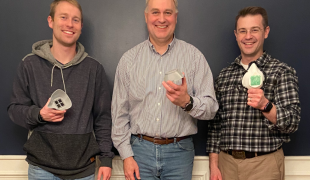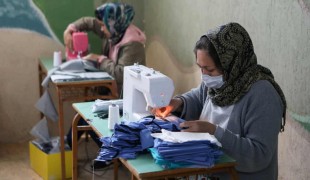- 9468
- 563
- 22
- 16
- 0
- Help Ukraine
About the solution
In Ethiopia, starting menstruations means that the girl is mature enough to get married. However, early marriage often means child pregnancy and obstetric fistula. That’s why a lot of Ethiopian girls feel ashamed when they’re on period, suffering in silence to the shame and fear. Also, most of these girls aren’t able to afford sanitary pads and tampons. They use old pieces of clothing instead (sometimes they use large scarves to cover themselves if their clothes became stained), which is not hygienic and can compromise their health. Also, there is a belief that menstruating girls are impure, so many adolescents miss school days and they are likely to fall behind in studies and even drop out eventually, ruining their career.
When Freweini got her first period, she was terrified. She used rags and didn’t tell her mother and sisters about it, despite the need to understand situations like cramps and irregular periods.
Freweini went to the USA to study. During her first visit to a local drug store, in 1983, she was overwhelmed by the choices of sanitary pads. This made her think about girls back in Ethiopia, who don’t have access to this product.
After she got her degree, Freweini stayed in the USA where she worked for 10 years. When she came back to Ethiopia, she was shocked to see that the situation regarding girls and periods was still the same.
“The stories I heard were shocking – digging a hole and squatting over it for three to five days, or wrapping themselves in strips of cloth,” the woman said.
This made her take action. In 2005, she created a patented reusable menstrual pad. Three years later, she founded her own company - Mariam Seba Sanitary Products Factory - to mass-produce and commercialise these pads.
These pads and fully washable, made from an absorbent cotton lining and waterproof backing. They can be attached to the underwear with a button.
According to the CNN: “the design allows it to fold up into a small, discreet package. The pads cost 90% less than a year’s worth of disposable pads and can last up to two years with proper care, making them environmentally friendly”.
Since 2009, nearly 800,000 girls and have benefited from these products. Freweini sells over 80 per cent of the pads she makes to non-governmental organisations which distribute them for free. Her other goal has been to attack the stigma surrounding menstruation by holding talks with students at schools.
Adapted from: https://bit.ly/2YuOX88
https://www.youtube.com/watch?v=-EKhKdMQ4Lw
This solution shall not include mention to the use of drugs, chemicals or biologicals (including food); invasive devices; offensive, commercial or inherently dangerous content. This solution was not medically validated. Proceed with caution! If you have any doubts, please consult with a health professional.
DISCLAIMER: This story was written by someone who is not the author of the solution, therefore please be advised that, although it was written with the utmost respect for the innovation and the innovator, there can be some incorrect statements. If you find any errors please contact the patient Innovation team via info@patient-innovation.com
-
-
380
-
0
-
4377

Students develop a project to help African women with hygiene
(SELF)-CARE: HYGIENE: Maintaining personal hygiene
Menstruation and Uterine Bleeding
Educational/Leisure device (book, toy, game...)
Body-Worn solutions (Clothing, accessories, shoes, sensors...)
Menstrual irregularities
Anxiety
Muscle cramps or spasms
Enhancing health literacy
Promoting self-management
Preventing (Vaccination, Protection, Falls, Research/Mapping)
Raise awareness
Gynecology and Obstetrics
Public Health
Kenya
-
-
-
328
-
0
-
4207

Team design and develop a 3D printed mask for medical professional
Social interaction
(SELF)-CARE: HYGIENE: Maintaining personal hygiene
Covid19
3d Printed
Body-Worn solutions (Clothing, accessories, shoes, sensors...)
Sore throat
Fever
Fatigue
Difficulty breathing deeply
Nasal congestion
Dry cough
Sinus pain or pressure.
Shortness of breath
Improving respiratory function
Promoting self-management
Promoting inclusivity and social integration
Preventing (Vaccination, Protection, Falls, Research/Mapping)
General and Family Medicine
Infectious Diseases
Internal Medicine
Pneumology
Public Health
United States
-
-
-
383
-
0
-
4927

Refugees start awareness team and sewing team to cope with the outbreak of COVID 19 within the refugee camp
(SELF)-CARE: HYGIENE: Maintaining personal hygiene
Social interaction
Covid19
Body-Worn solutions (Clothing, accessories, shoes, sensors...)
Strategy/Tip
Sore throat
Fever
Fatigue
Difficulty breathing deeply
Nasal congestion
Dry cough
Sinus pain or pressure.
Shortness of breath
Promoting self-management
Preventing (Vaccination, Protection, Falls, Research/Mapping)
Raise awareness
Caregiving Support
General and Family Medicine
Infectious Diseases
Intensive Care Medicine
Pneumology
Public Health
Greece
-
 en
en